
11 minute read
Offshore
Allseas completes the Gyda project
Holland’s Allseas Group is celebrating another major offshore milestone, the safe removal and transport to shore of Repsol Norge’s massive 30,000 tonne Gyda platform in a matter of days.
Advertisement
The 48,000 tonnes lifting capacity offshore demolition vessel Pioneering Spirit delivered the platform’s 11,000 tonne jacket to Aker Solutions’ disposal yard in Stord, Norway, less than 48 hours after removing it from the southern Norwegian Sea. The latest job for the vessel’s new jacket lift technology is one of the heaviest ever, but well within the system’s 20,000 tonne lift capacity.
The jacket was set down directly onto the quayside and reunited with its decommissioned drilling and production topsides, delivered by Pioneering Spirit in May this year. Aker Solutions expects to recycle around 98% of the facilities.
“Our mission at Allseas is to remain a frontrunner in the offshore energy market by pioneering ground-breaking technology to meet the industry’s ever-changing needs,” says Allseas President Edward Heerema. “The Gyda platform removal strengthens our reputation as a game changer in the industry. Again, we have shown that Pioneering Spirit provides a significantly faster, safer, more efficient and sustainable option for the removal and installation of offshore facilities.”
Split across two campaigns to allow for the vessel’s busy schedule, Pioneering Spirit completed the removal, transport and load-in to the disposal yard of the entire Gyda platform, its 32 conductors and template in 12 days. To facilitate removal of the jacket, the structure’s 24 foundation piles were cut below seabed level. Main hoist blocks suspended from the Jacket lift system (JLS) beams were connected to preinstalled rigging and the entire structure lifted and aligned with the lifting beams.
As the jacket was vertically fabricated and installed, the structure could not sustain loading in the horizontal position during transport. The solution of transporting the jacket in a nearvertical (60%) position, with interface supports and grillage made delivery of the complete jacket to the yard possible.
Unlike conventional lift vessels, Pioneering Spirit only requires days in the field to remove entire platforms and subsea facilities, eliminating the need for multiple trips and a support fleet. Saving time and reducing vessel operations to a minimum significantly reduces the vessel’s emissions footprint.
The world’s largest construction vessel will now mobilise for further heavy lift commitments. These include further jacket removals, as well as installation of a major offshore wind transmission station and jacket in the German North Sea that will supply clean electricity to tens of thousands of homes.
In what has been a busy year for Pioneering Spirit, the vessel has already lifted and transported more than 90,000 tonnes of decommissioned and new offshore facilities for the offshore energy industry in 2022, deploying both its Jacket lift and Topsides lift systems.
Allseas’ Pioneering Spirit and Oceanic work on the removal of the Gyda jacket
Keppel wins Brazilian FPSO contract
Singapore’s Keppel Offshore & Marine’s wholly owned subsidiary, Keppel Shipyard, has won an international tender from Brazil’s Petroleo Brasileiro S.A (Petrobras), for the engineering, procurement and construction (EPC) of P-80, a FPSO, the award worth some US$2.9bn.
Scheduled for completion in first half of 2026, the P-80 is the second FPSO which Keppel will be building for Petrobras for the Buzios field in Brazil. The first FPSO, P-78, is currently under construction by Keppel Shipyard. The P-80 is structured on progressive milestone payments and will be cash-flow neutral during its execution lifecycle. It would add over Sing$4bn to Keppel’s orderbook.
The P-80 will be one of the largest floating production units in the world with a production capacity of 225,000 bbls of oil/day, water injection capacity of 250,000 bbls/day, 12m m3 of (Sm3/d) of gas processing/day and a storage capacity of 2m bbls of oil. When completed, the P-80 will be on par with the largest oil producing platforms in Brazil.
Chris Ong, CEO of Keppel O&M, said, “We are pleased to be selected by Petrobras for a repeat order of yet another landmark FPSO, which reaffirms our capabilities as the preferred development partner for complex turnkey projects. By leveraging our strong EPC capabilities and network of yards, as well as teaming up with leading industry specialists, we have been able to offer a win-win solution that is both cost effective for our customer and profitable for Keppel O&M and our partners.
“Our first such project for the Buzios field, the P-78, is being built on this operating model. It is progressing on track with its schedule and within budget and has been contributing to Keppel O&M’s earnings. Drawing from our experience with the P-78, we are confident that we can further enhance the efficiency and economics of the P-80, as well as generate a substantial amount of work in Brazil with thousands of jobs for the country.”
Keppel will harness its global network of yards, offices and partners to undertake the project execution. The design and engineering will be carried out through its centres in Singapore, Brazil, China and India. The fabrication of the topside modules which weigh about 47,000 tonnes in total will be spread across its facilities in Singapore, China and Brazil, with the integration and commissioning works to be completed in Singapore.
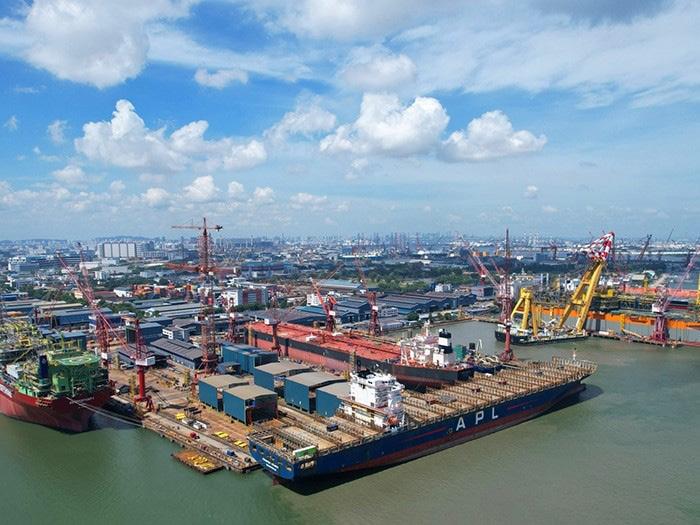
Keppel’s Tuas Shipyard in Singapore
Construction of the hull and accommodation will be carried out by CIMC Raffles in China. Keppel will also undertake the final phase of offshore commissioning works when the FPSO arrives at the Buzios field.
Petrobras operates the world’s largest carbon capture, utilisation and storage (CCUS) programme. The P-80, along with the P-78, will incorporate green features such as carbon capture and reinjection of carbon back into the reservoir where it is stored. Both FPSOs are designed to maximise carbon reinjection and minimise the need for gas flaring.
In addition to CCUS, the P-80 will also be outfitted with energy recovery systems for thermal energy, waste heat and gas, as well as seawater de-aeration to reduce the consumption of fuel and the carbon emissions of the vessel.
Mr Ong added, “As a leader in providing sustainable offshore energy and infrastructure assets, Keppel is glad to be able to support Petrobras in reducing the carbon emissions of the P-80 and P-78. Our partnership with Petrobras in their decarbonisation journey over the years includes work on four other FPSO projects, which showcase various innovative sustainability features, and we look forward to build on our strong track record of delivering high quality vessels to them.”
Keppel has delivered a significant number of projects for Brazil and Petrobras over the years, which includes FPSOs, production platforms, FSRUs, drilling rigs and accommodation vessels, to support Brazil’s energy infrastructure. BrasFELS, Keppel’s yard in Angra dos Reis, Brazil is currently undertaking integration and fabrication work for two other FPSOs that will operate in the Sepia field and the Buzios field.
GMS announces launch of advisory service
Global Maritime Services (GMS) has announced the launch of its new Marine Department, a marine advisory service for the offshore oil and gas sector. Customers will be able to take advantage of GMS’s expertise to secure their FSRUs and LNG sector ventures.
There is a scramble to secure reliable gas supplies across Europe ahead of the winter season. The European Commission’s RePowerEU initiative recommends the diversification of gas supplies from other international partners in case of a disruption of Russian gas supplies in the near future. Energy providers are keen to find natural gas solutions that can swiftly fulfil the demand for power generation. This is where FSRUs come into the picture, as they are a customisable, accelerated LNG import solution. Building conventional shore-based LNG import terminals can take years, whereas FSRUs are fully operational within months. Compared to onshore LNG terminals, FSRUs also require relatively low investment to start operations. Ultimately, FSRUs provide new entrants into the LNG import market with a fasttrack solution to cater to their energy needs.
Founded in 2008, GMS and its experienced Marine Team will now provide tailor-fit advisory services to clients exclusively engaged in floating technology projects for the FSRU/LNG sector. GMS’s principal experts bring with them more than 30 years of practical knowledge of LNG tankers and FSRUs – including extensive onboard experience.
GMS’s Marine Advisory Team can also provide support for a wide range of inspections – from management system and environmental system audits, assistance with port-state control inspections, vetting and tanker management, and self-assessment inspections, to navigation, safety, cargo, and mooring equipment audits. The ten-person team includes a Marine Regulatory advisor with keen insight into the latest regulations and legislation affecting the maritime sector.
The rapidly evolving floating gas technology favours stakeholders focused on accessing more efficient and readily available gas supply options beyond the conventional pipeline gas. Tončić, along with his team, aims to make a notable contribution to their client’s business excellence by using his team’s comprehensive experience in the Regas and LNG/FSRU domain. He believes this approach will encourage the development of sustainable and efficient maritime projects.
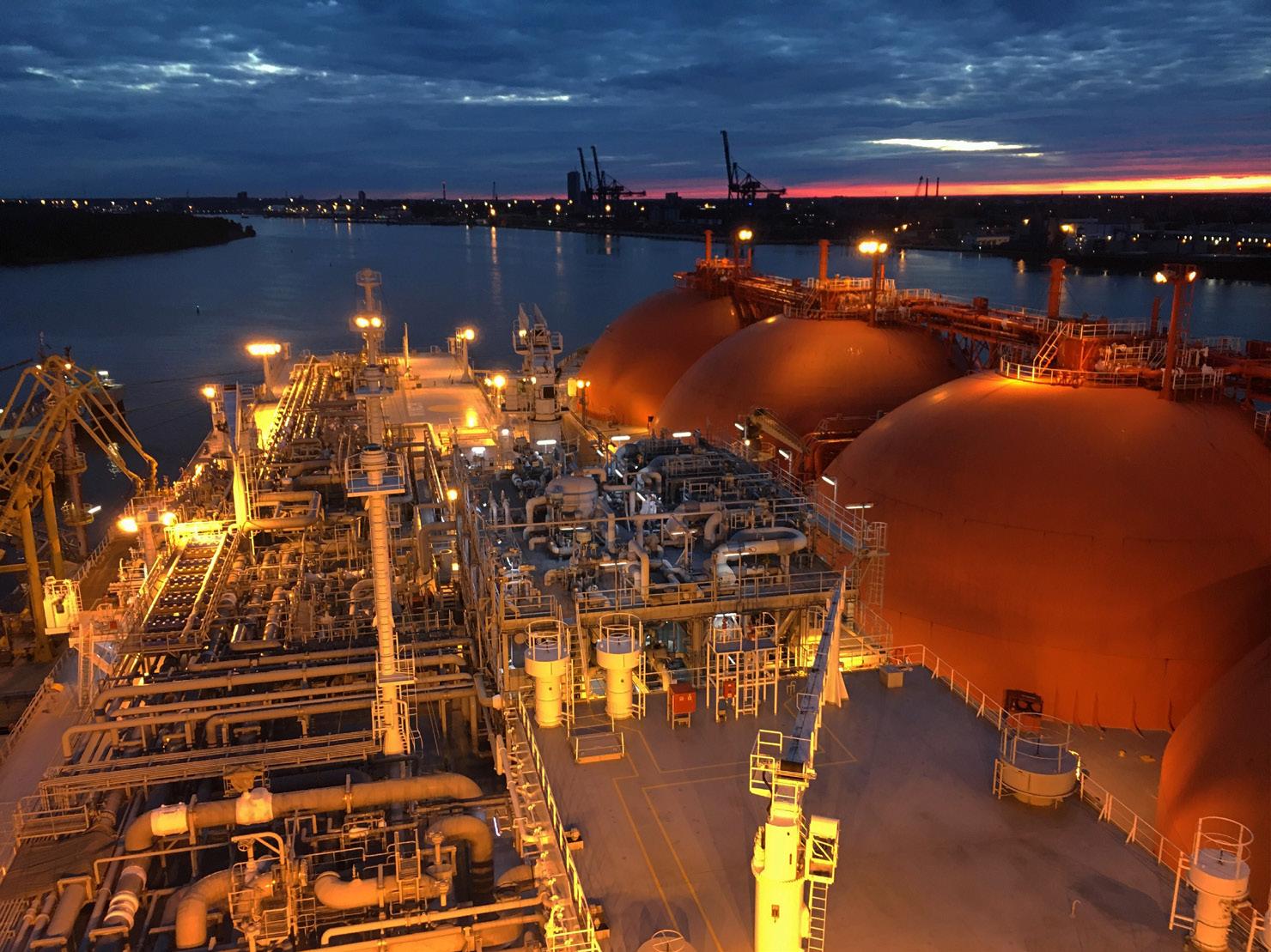
FSRU Operation –Tresorit - STS Europe
German success for EST Floattech
Holland’s EST-Floattech opened a dedicated German office in Hamburg in August 2021. Staffed with two sales managers and a technical project manager, this decision is now really
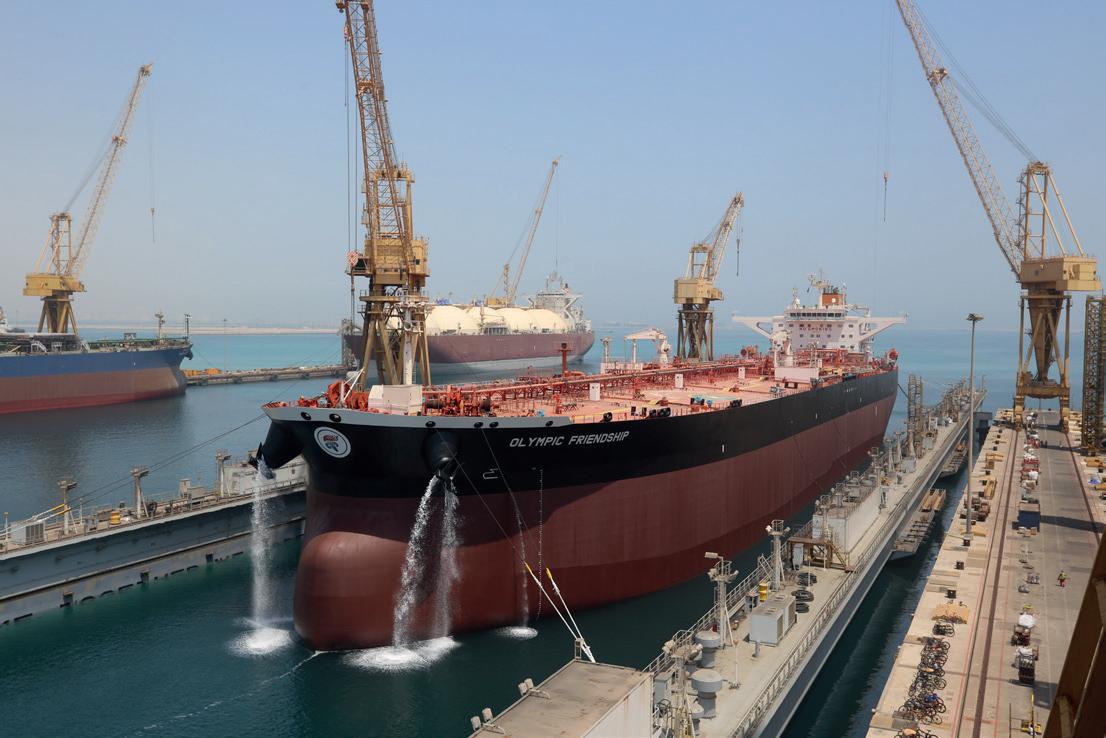
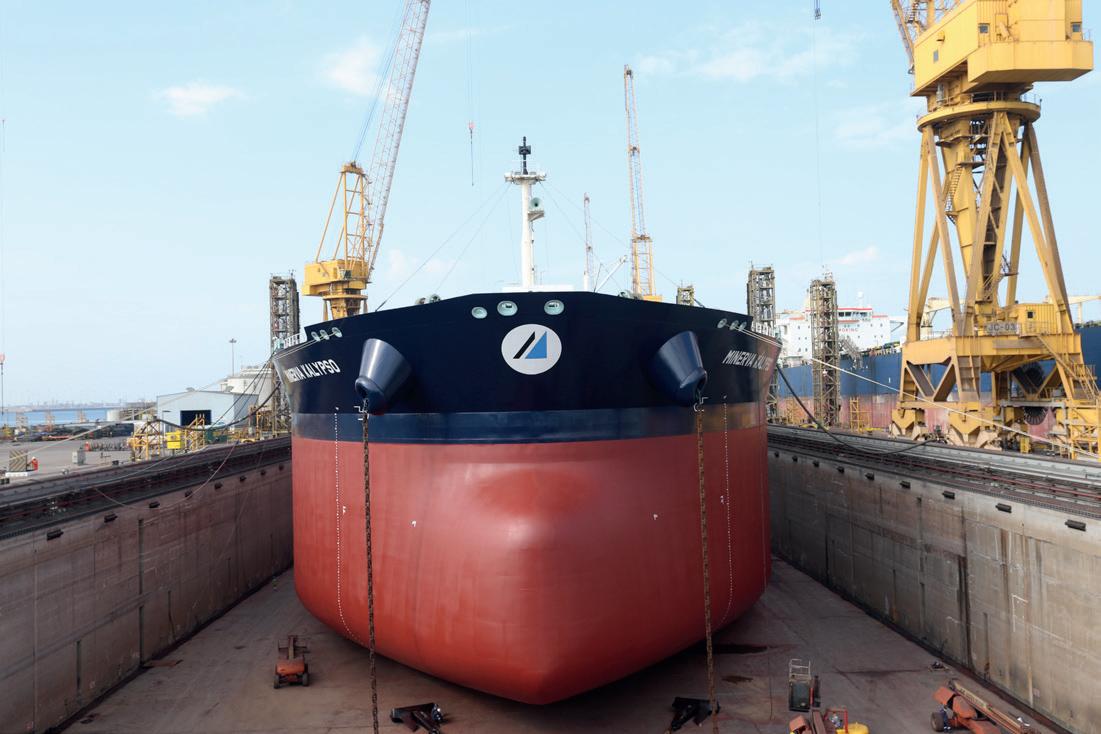


The EST-Floatech team in Hamburg
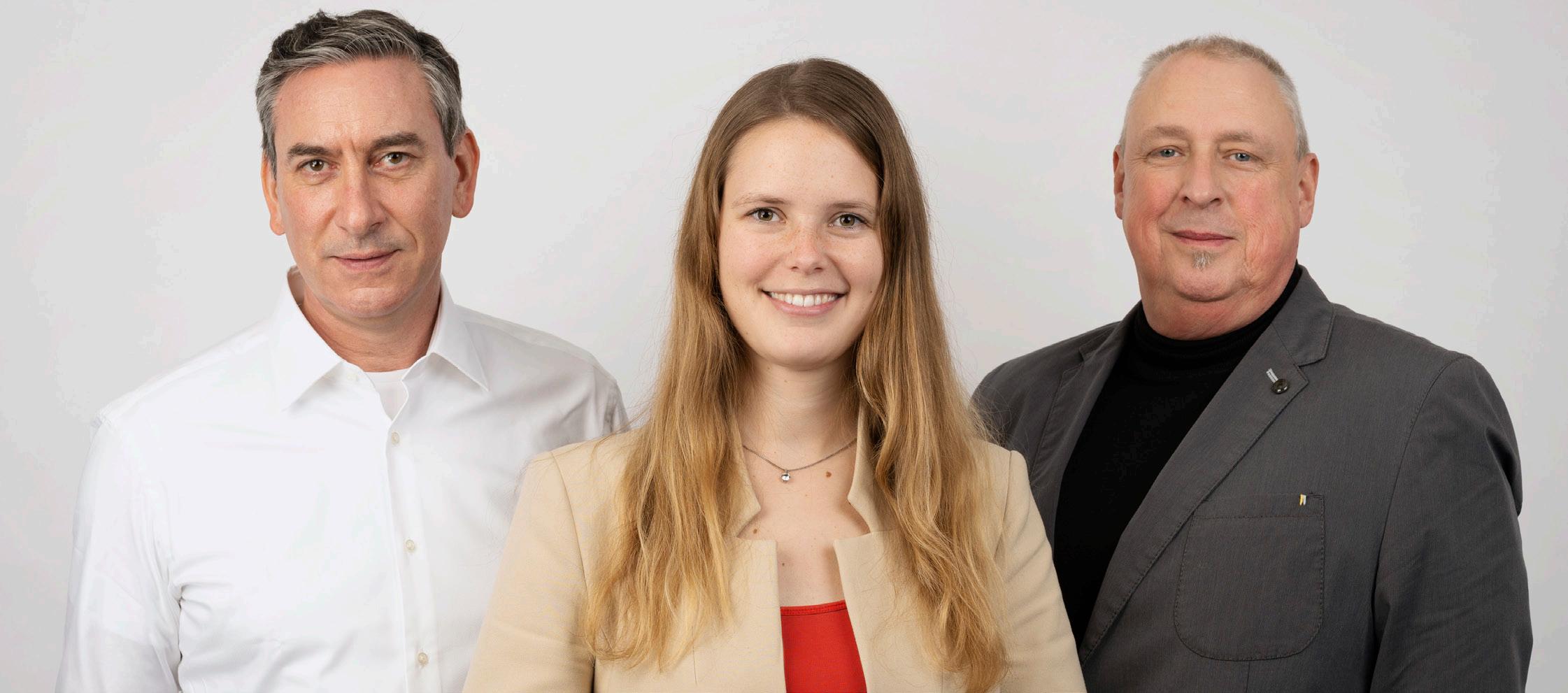
paying off its sustainable, safe and reliable battery solutions are in demand in Europe and also in Asia. In addition to inland waterways and government projects, the first of several upcoming orders for offshore wind vessels has now been placed.
Less than a year after its opening, the Hamburg office can celebrate a success - at the beginning of June 2022, a customer from Southeast Asia ordered the delivery of a battery pack for an offshore wind support vessel.
This order is just one example of how ESTFloattech has established itself in the market. Since its foundation in 2009 in the Netherlands, the company has grown continuously and is one of the leading suppliers of lithium-polymer battery systems. The number of customers and projects has increased significantly in recent years, which is why ‘EST-Floattech GmbH’ was founded in August 2021. Working in the Kallmorgen Tower, which is located in the immediate vicinity of Hamburg’s HafenCity, Josefin Klindt and Marc Mühlenbeck (sales) and technical project manager Frank Gawehns are combining their experience for these projects. The team looks after the German-speaking market, incl. the DACH region. The Italian, Polish, Danish and Southeast Asian markets will also be served from Hamburg, showing the current diversity and growth in hybrid and electric propulsion needs. All other countries are served from the Dutch HQ.
EST-Floattech’s more than 200 projects worldwide, including in Germany, include the zero-emission ferry operated by SFK (Kiel), which has been in operation since 2021, and numerous river cruise ships operated by Viking. Customers and crew of the two fire-fighting boats Dresden and Hamburg of the Hamburg fleet are also satisfied with the battery system from EST-Floattech after more than 200 days in operation. Last, but not least, there’s the Elektra, the first-ever hydrogen propelled pusher, sailing either in hydrogen-electric or full electric mode.
In addition to the proven and already widely used battery module ‘Green Orca 1050’, certified by DNV and also complying with the BinSchUO and ES-TRIN rules, the High Energy NMC, High Power NMC and High Energy LFP of the new OCTOPUS series are almost ready for deployment. In close collaboration with system integrators, shipyards, design agencies and engine suppliers, the team is committed to further growth, both as to production and knowledge-sharing, to facilitate its goal of zeroemission shipping.
FPSO contract for MSS
Denmark’s Maersk Supply Service (MSS) has been awarded an integrated solutions contract by Shell Brasil, for a station-keeping assignment during the removal of the emergency Gas Lift Riser on the FPSO Fluminense.
The scope of the project includes remediation work on two of the Fluminense’s mooring lines. With the onshore engineering already well underway, offshore operations are due to run for three weeks from late August 2022. The offshore work will utilise up to three of MSS’s anchor handling vessels to hold the FPSO on station and perform subsea operations.
This will be the third time MSS has supported Shell Brasil on the FPSO Fluminense’s mooring lines, having completed a station-keeping assignment during the emergency removal of a Gas Lift Riser earlier this year, and provided mooring lines life extension solutions in 2019. Once the project is completed, MSS will have either replaced or maintained each one of the mooring lines holding the FPSO Fluminense in place.
“We are very pleased that Shell Brasil has once again shown this trust in MSS, and we will continue to work hard to deliver high-quality service and safe operations for our client,” says Rafael Thome, Managing Director for Brazil at MSS.
MSS continues to consolidate its presence in Brazil, both through its contracts with Shell Brasil and the major Mero2 project on behalf of Petrobras, with its integrated market offering of project management, technical expertise, and towing and mooring solutions.
SORJ

The FPSO Fluminense




